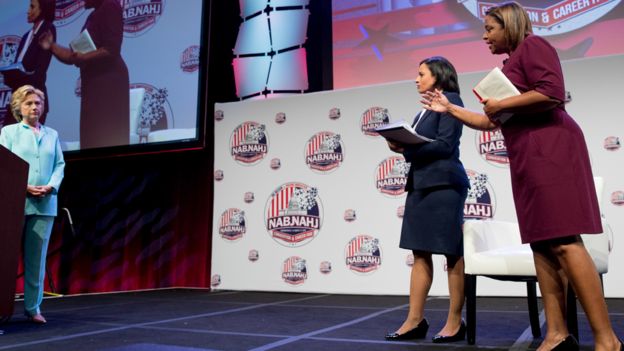
This article is more than
9 year oldClinton's speech had historic potential, but it was in many ways another day at the office for the first woman to become a major party's presidential nominee.
While journalists of colour were in the room, substantial questions focusing on the needs of the two communities represented - blacks and Latinos - were few and far between.
It felt in the end like a missed opportunity.
In a speech that varied only slightly from her Democratic nomination acceptance speech, Clinton talked about what she would do if elected president, focusing mostly on domestic policy. She later took questions sent via Twitter from a panel of journalists who acted as proxies for their more than 2,000 colleagues in ballroom of the Washington Waldman Park Hotel.
These journalists represent the interest of a powerful voting block. Clinton leads with black voters 99% to 1% over Trump, and has 48% more support than Trump does among Latinos, but she'll need them to turn out with enthusiasm on election day, especially in order to secure victories down ticket.
Clinton did speak to some issues relevant to her audience: during the Great Recession, black and Latino households were hit the hardest, with blacks losing half of their wealth and Latinos losing over 60%. The Democratic candidate said she would dedicate significant time to restoring those gains in her first 100 days as president.
She also recognised the economic potential of comprehensive immigration reform, something that's been a non-starter for much of the Obama administration. Undocumented workers contribute as much as $100m (£77m) to the American economy, Clinton said. Rather than keep hard-working immigrants out of the American mainstream, Clinton told the crowd, it was time to find a way to keep them in.
"We have to bring people out of the shadows," she said.
The crowd had been promised a question-and-answer period that would address some of the other issues that these two communities face: immigration reform, criminal justice reform, mass incarceration, as well as improving the nation's schools, especially in urban and rural areas.
Those questions never came.
That might have been, in part, a function of of time allotted. Clinton initially promised an hour of her time, but the event started at least 20 minutes late and she cut her commitment back to 30 minutes.
Kristen Welker of NBC News asked a question Clinton's email servers. Clinton's answers - that she "short circuited" when claiming that FBI director James Comey called her answers in the ensuing investigation "truthful" - led the news cycle for the weekend.
But many wondered why a question about Clinton's email servers made the cut while a question about criminal justice reform didn't.

At a time when her campaign, or at least the press coverage of it, seems to be focused on Clinton's attempts to reach out to white, working-class male voters and Republicans disenchanted with Donald Trump, a question from New York Times reporter Yamiche Alcindor made sense:
How do you reach a group of people whose idea of "Making America Great Again" doesn't seem to include many of the people in the room you're currently in?
"I have talked to them, and we have to recognise that some of what makes Trump appeal to them is the problems they've had economically," Clinton said. "Let's not lose sight of their pain."
Clinton appeared sincere in recognising that these are people who have been hurt by the economy and need attention. But many of these voters are the same ones chanting "Lock Her Up!"
Instead of trying to connect with groups that have made it clear that they're not interested in hearing what she has to say, Clinton should seek to address issues of particular interest to the Obama coalition of black and Latino voters - and black and Latino journalists need to make sure they bring those issues to the forefront.
Denise Clay is a writer and columnist based in Philadelphia.